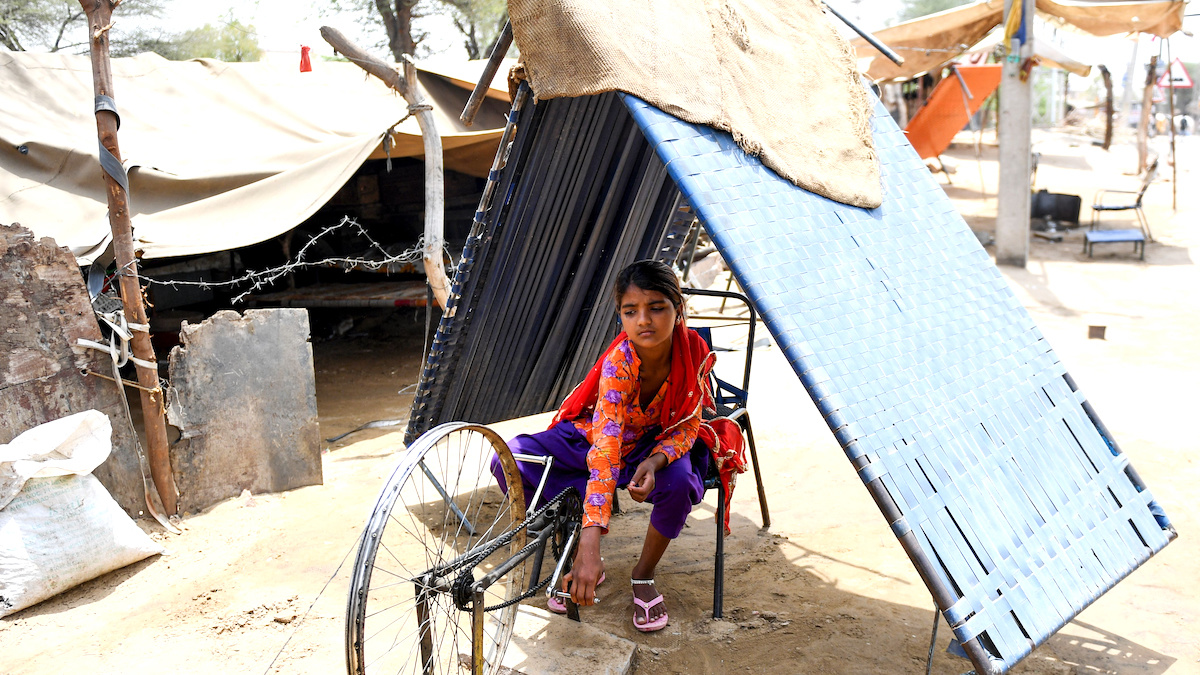
Rising Temperatures to Be More Deadly Than Infectious Diseases, New Study Says

A girl sits under a temporary shade made by joining two bed in Churu, Rajasthan on June 4, 2019. Temperatures in the Indian desert city hit 50 degrees C (122 F) for the second time in three days, sending residents scrambling for shade. MONEY SHARMA / AFP via Getty Images
Current efforts to curb an infectious disease show the potential we have for collective action. That action and more will be needed if we want to stem the coming wave of heat-related deaths that will surpass the number of people who die from all infectious diseases, according to a new study, as The Guardian reported.
By the end of this century, extreme heat spells could kill roughly as many people as all infectious diseases combined, including HIV, malaria and yellow fever, according to a new study from the Climate Impact Lab, a group of climate economists and researchers at several U.S. universities. Specifically, the study projects that climate change’s effect on temperatures could raise global mortality rates by 73 deaths per 100,000 people in 2100 if greenhouse gas emissions stay where they are, according to MIT Technology Review. Under a scenario of continued high emissions, the researchers estimate that climate change’s impact on mortality will cost the world roughly 3.2 percent of global economic output in 2100, according to the Climate Impact Lab.
“The global cost to human health from warming is likely to be profound,” said Solomon Hsiang, a climate policy researcher at UC Berkeley and an author of the study, in a UC Berkeley press release. “We are studying the risk of death faced by our own children. Today’s 10-year-old fifth-grader will turn 65 in 2075, facing mortality risks from climate change every year of their retirement. Failing to address climate change is not that different from driving your kids around without a seat belt: you are putting their lives at risk.”
To conduct the study, the authors analyzed the historic links between temperature records and mortality data in dozens of nations, and projecting future deaths using highly regional climate projections. They sifted through the information in an enormous global dataset of 399 million death records across 41 countries, accounting for 55 percent of the global population. They also looked at temperature records to see how the two are related. That methodology allowed them to pinpoint both direct causes such as heat stroke and less obvious links such as a spike heart attacks during a heat wave, as The Guardian reported.
The researchers accounted for the mitigations that wealthy countries make, like air conditioning and cooling centers, leading them to the conclusion that poorer countries will bear the brunt of the suffering from extreme heat.
“A lot of older people die due to indirect heat [effects],” said Amir Jina, an environmental economist at the University of Chicago and a co-author of the study, published by the National Bureau of Economic Research, as The Guardian reported. “It’s eerily similar to Covid – vulnerable people are those who have pre-existing or underlying conditions. If you have a heart problem and are hammered for days by the heat, you are going to be pushed towards collapse.”
In the worst-hit countries, including Ghana, Bangladesh, Pakistan and Sudan, climate change could be responsible for an additional 200 or more deaths per 100,000 by the end of the century, the research shows, according to the Climate Impact Lab. By contrast, places like Canada and Norway will see fewer weather-related deaths and fewer people will die from freezing temperatures as they become less frequent.
“You see the really bad impacts at the tropics,” added Jina. “There’s not one single worldwide condition, there’s a lot of different changes with poorer people much more affected with limited ability to adapt. The richer countries, even if they have increases in mortality, can pay more to adapt to it. It’s really the people who have done the least to cause climate change who are suffering from it.”
- Potentially Deadly Heat and Humidity Levels Are Already Here and ...
- 'Black Moms Matter': Increased Heat and Pollution Raise Pregnancy ...
- Trump Administration Buries Government-Funded Studies Showing ...
- Ocean Warming Dooms Most Fish, Study Says - EcoWatch
- Rising Temperatures May Cause 2,100 Annual U.S. Deaths ...

 233k
233k  41k
41k  Subscribe
Subscribe 